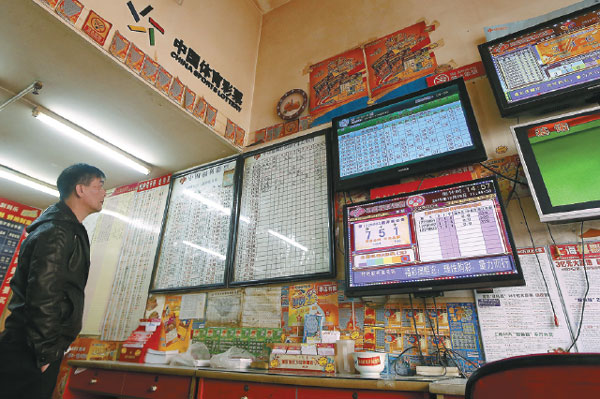Lottery income gets closer look
|
A customer checks out the lottery information displayed on screens at a lottery ticket store in Shanghai. Aly Song / Reuters |
The top audit authority has stepped up efforts to examine the management of billions of dollars collected from China's booming lottery market.
Inspection teams sent to 18 provinces by the National Audit Office since the middle of November will take a month to check how lottery income has been allocated in each area.
A source at the audit office said the move is something of a surprise, as audits of the provincial lottery industry were not listed in the annual work plan.
The management and allocation of the income will be targeted over an exceptionally large area, the source said.
The operation will be conducted solely by the National Audit Office, and local auditors are prohibited from interfering in its work to avoid a conflict of interest, the source added.
China's lottery sales in October reached 32.7 billion yuan ($5.34 billion), a year-on-year increase of 20.3 percent. Welfare lottery sales were 17.75 billion yuan, up 14.5 percent year-on-year, while sports lottery sales rose by 27.9 percent year-on-year to 14.95 billion yuan.
Under the country's lottery management rules, proceeds from lottery ticket sales cover administrative fees and public welfare projects as well as jackpots.
China approved its first national lottery program in June 1987 for social welfare. The China Welfare Lottery, run by the Ministry of Civil Affairs, played a major role in providing valuable welfare funds. The Sports Lottery was introduced in Fujian province in 1984 and later became a national nonprofit program in the 1990s.
After reports of lottery funds being misused were published in the past year, the public began to question how the income is spent, with such disclosures being limited.
The latest scandal involves the embezzlement of 34 million yuan in sports lottery income.
According to audit results published last year, the sports lottery management authority in Shandong province spent the money on reconstructing government buildings and buying government cars from 2009 to 2012. Under the management rules, the money should be used for public sports affairs, including the construction of sports facilities.
Ten cities in the province failed to hand in the proceeds of tickets sales totaling 214 million yuan to the designated account, and 102 million yuan was misused in eight cities and 44 counties.
Wang Dehua, a finance scholar at the Chinese Academy of Social Sciences, said the rules on managing and spending lottery funds as well as the supervisory system should be updated.
Public welfare funds should also be allocated more efficiently, Wang said.
zhangyi@chinadaily.com.cn



















